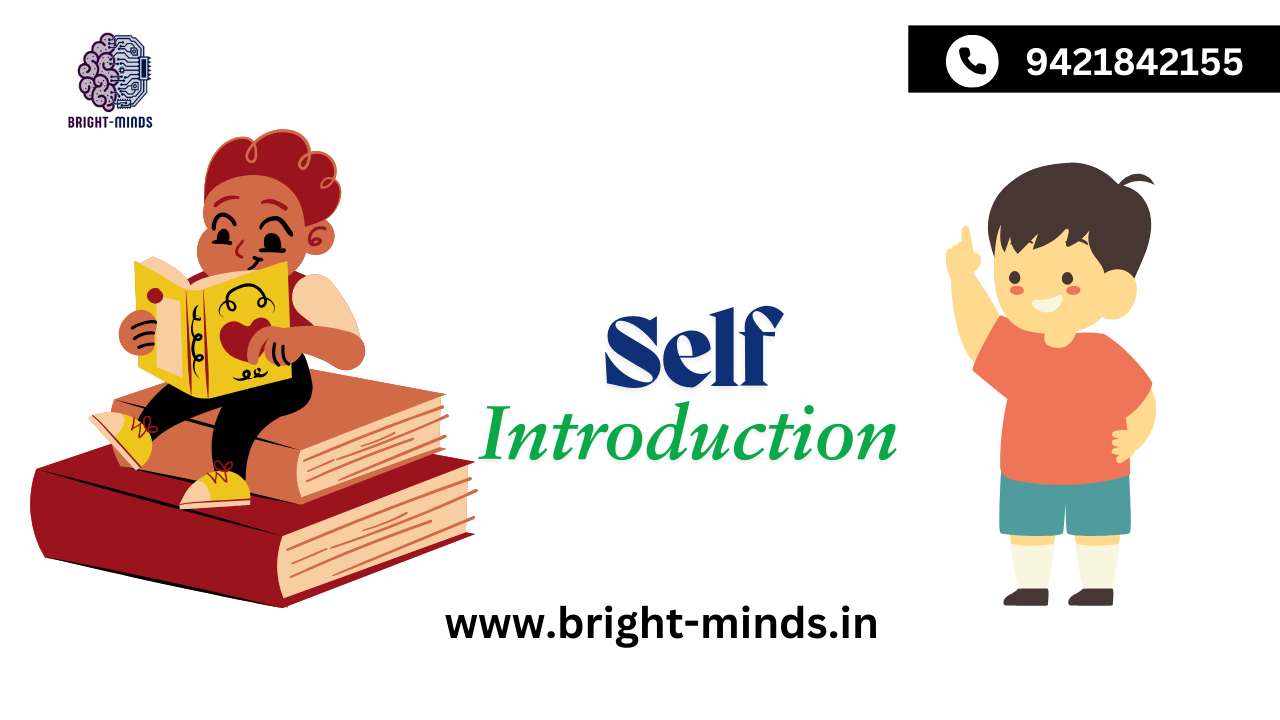Introduction:
Introducing yourself effectively is a vital skill that students should master early in their
academic journey. Whether you are entering a new school, attending a public speaking
event, or participating in a classroom activity, a well-crafted self-introduction can leave a
lasting impression. This blog will guide you through the process of delivering a clear,
confident, and engaging self introduction in English for students.
Why Is Self Introduction Important for Students?
Self introduction for students is more than just saying your name and a few facts about
yourself. It is your first opportunity to communicate who you are, what you stand for, and
what you bring to the table. A strong self introduction in English helps students build
confidence, connect with peers and teachers, and set the tone for their interactions. It’s
a skill that not only enhances communication but also plays a crucial role in personal
development.
The Structure of a Self Introduction in English for Students
When preparing a self introduction in English, students should follow a clear and simple
structure. Here’s a basic outline that can help:
- Greeting and Name: Start with a warm greeting, followed by your full name.
- Background Information: Share a bit about your family, where you are from, and
any relevant personal details. - Educational Background: Mention your current grade, school, and any significant
academic achievements or interests. - Hobbies and Interests: Highlight your hobbies, passions, or any extracurricular
activities you enjoy. - Future Goals: Briefly discuss your aspirations and what you hope to achieve in
the future. - Conclusion: End with a thank you or a positive note, inviting further interaction.
This structure ensures that your student self introduction is comprehensive, organized,
and easy to follow.
Self Introduction Example for Students
Here’s a self introduction example for students that follows the structure outlined above:
Good morning, everyone! My name is _ I’m from Pune, and I’m currently in the
at . I come from a family of four, and we’ve lived in Pune all our
lives.
Academically, I’ve always been passionate about science, especially biology. Last year,
I won the first prize in our school’s science fair for my project on renewable energy. I
also enjoy participating in debates and have been a part of our school’s debate team for
two years now.
Apart from my studies, I love painting and reading. I spend most of my weekends
working on my art projects or diving into a good mystery novel. I also play the guitar and
recently started taking lessons to improve my skills.
In the future, I aspire to become a scientist, working on sustainable energy solutions. I
believe that with dedication and hard work, I can make a difference in the world. Thank
you for listening, and I’m excited to get to know all of you better!”
Tips for Delivering a Strong Self Introduction Speech in English
- Practice Regularly: Practice your self introduction speech in English regularly to
build confidence. The more you practice, the more comfortable you will become
with the content and delivery. - Maintain Eye Contact: When delivering your introduction, make sure to maintain
eye contact with your audience. This helps establish a connection and shows
that you are confident. - Speak Clearly and Confidently: Pronounce your words clearly and avoid rushing
through your speech. A calm and steady pace makes your self introduction more
understandable and engaging. - Be Authentic: While it’s important to prepare, make sure your self introduction
feels natural and genuine. Avoid memorizing it word for word; instead, focus on
conveying your message in your own voice. - Keep It Concise: While it’s important to provide enough information, keep your
self introduction concise. Aim to deliver your message in about 1-2 minutes,
ensuring it is brief yet informative.
How to Introduce Yourself as a Student in Different Situations
The context of your self introduction in English may vary depending on the situation.
Here’s how to tailor your introduction for different scenarios:
- In the Classroom: When introducing yourself in a classroom, focus on your
academic background and interests. Mention any subjects you are particularly
passionate about and how you plan to contribute to the class. - At a Public Speaking Event: If you are giving a self introduction at a public
speaking event, emphasize your skills and experience related to the topic of the
event. Highlight any previous speaking engagements or relevant achievements. - During a School Admission Interview: When introducing yourself during a school
admission interview, concentrate on your academic achievements, personal
strengths, and why you are interested in the school. Show enthusiasm and a
willingness to learn. - In an Online Classroom: In online classes, your self introduction can include
details about your location, your experience with online learning, and any
hobbies or interests you pursue at home. This helps create a more personal
connection in a virtual setting.
Common Mistakes to Avoid in a Student Self Introduction
- Being Too Vague: Avoid providing too little information. Be specific about your
achievements, interests, and goals to make your introduction more impactful. - Overloading with Information: While it’s important to be informative, don’t
overload your introduction with too many details. Stick to the key points that you
want your audience to remember. - Speaking Too Fast: Speaking too fast can make your introduction difficult to
understand. Practice speaking at a moderate pace to ensure clarity. - Lack of Preparation: A poorly prepared self introduction can come across as
unprofessional. Take the time to organize your thoughts and practice before
delivering your introduction.
Also Read:
https://bright-minds.in/unlocking-word-meaning-for-class-ukg-english-to-hindi/

